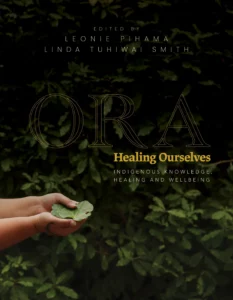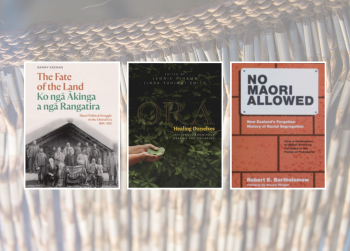A selection of some of the recent additions to te kohikohinga Māori. Also, with the recent closure of our He Matapihi branch, be sure to visit Te Awe Brandon Street Library to view the expanded collection.
No Māori allowed : New Zealand’s forgotten history of racial segregation : how a generation of Māori children perished in the fields of Pukekohe / Bartholomew, Robert E
“There was a time when Māori were: barred from public toilets, segregated at the cinema & swimming baths, refused alcohol, haircuts & taxi rides, forced to stand for white bus passengers, not allowed to attend school with other students. From 1925 to the early 1960s, hundreds of Māori infants and children died there in the racially segregated slums where they were forced to live in shacks and manure sheds on the edge of town, away from European residents. Using records from the National Archives and first hand interviews, No Māori Allowed looks at what happened at Pukekohe and the extent of racial intolerance across the country at this time.” (adapted from Catalogue)
 Ora : healing ourselves : indigenous knowledge, healing and wellbeing
Ora : healing ourselves : indigenous knowledge, healing and wellbeing
“This collection brings together indigenous thinkers and practitioners from Aotearoa and internationally to discuss the effects of trauma on indigenous peoples across social, economic, political and cultural environments. The authors explore understandings and practices of indigenous people, grounded in the knowledge of ancestors and based on research, that facilitate healing and wellbeing. It discusses tikanga Māori concepts, decolonising approaches and navigating mauri ora, and explores indigenous models of healing, focusing on connections to land and the environment, whakapapa connections and indigenous approaches such as walking, hunting, and growing and accessing traditional foods for wellbeing.” (adapted from Catalogue)
The fate of the land = Ko ngā ākinga a ngā rangatira : Māori political struggle in the Liberal era 1891-1912 / Keenan, Danny
“In the second half of the nineteenth century, settlers poured into Aotearoa demanding land. Millions of acres were acquired by the government or directly by settlers. By 1891, when the Liberal government came to power, Māori retained only a fraction of their lands. And still the losses continued. For rangatira such as James Carroll, Wiremu Pere, Pāora Tūhaere, Te Keepa Te Rangihiwinui, and many others, the challenges were innumerable. To stop further land loss, some rangatira saw parliamentary process as the mechanism; others pursued political independence. How those rangatira fared, and how they should be remembered, is the story of Māori political struggle during the Liberal era” (adapted from Catalogue)
A kind of shelter = Whakaruru-taha
“Sixty-eight writers and eight artists gather at a hui in a magnificent cave-like dwelling or meeting house. In a series of rich conversations, those present discuss our world in the second decade of this century; they look at decolonisation, indigeneity, climate change . . . this is what they see. Edited by Witi Ihimaera and Michelle Elvy, this fresh, exciting anthology features poetry, short fiction and creative non-fiction, as well as kōrero or conversations between writers. The lineup from Aoteraoa includes Alison Wong, Paula Morris, Anne Salmond, Tina Makereti, Ben Brown, David Eggleton, Cilla McQueen, Hinemoana Baker, Erik Kennedy, Ian Wedde, Nina Mingya Powles, Gregory O’Brien, Vincent O’Sullivan, Patricia Grace, Selina Tusitala Marsh and Whiti Hereaka. Guest writers from overseas include Jose-Luis Novo and Ru Freeman.” (adapted from Catalogue)
TV and Te Tiriti : key factors in Aotearoa’s bicultural surge / Leslie, Brent
“In recent decades, New Zealand has changed remarkably in its bicultural attitudes, but why? Covering major turning points until the end of 2022, experienced writer and TV documentary maker, Brent Leslie, brings a unique perspective on this change and strong reasons for having considerable confidence in the future.” (Catalogue)


